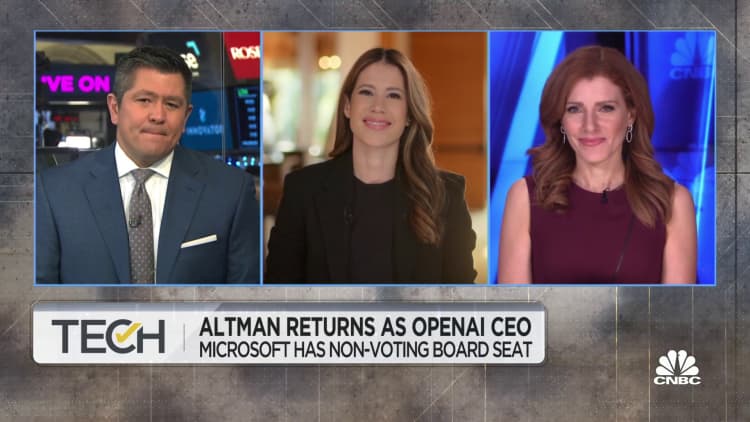Reid
Hoffman
Anjali
Sundaram
|
CNBC
Three
weeks
after
OpenAI’s
board
briefly
pushed
out
CEO
Sam
Altman
without
providing
a
specific
reason
for
its
decision,
former
director
Reid
Hoffman
says
he’s
still
puzzled
by
what
took
place
and
why.
“Reading
the
blog
post
was
like,
‘What’s
going
on?'”
Hoffman,
the
co-founder
of
LinkedIn
and
a
prominent
startup
investor,
said
onstage
at
Wired’s
LiveWired
conference
in
San
Francisco
on
Tuesday.
“I
still
don’t
think
we
fully
know.”
Altman
was
ultimately
brought
back
to
lead
the
high-profile
artificial
intelligence
startup
after
a
major
push
by
top
investors
and
the
threat
of
a
mass
exodus
among
the
company’s
workforce.
The
board
is
now
undergoing
a
facelift,
which
includes
the
departure
of
some
longtime
directors,
but
all
the
parties
involved
have
remained
largely
mum
on
what
led
to
the
initial
chaos.
Bloomberg
reported
that
Altman
had
been
looking
to
raise
money
for
a
new
AI
chip
startup.
The
New
York
Times
said
OpenAI
co-founder
Ilya
Sutskever
thought
Altman
wasn’t
focused
enough
on
the
potential
risks
of
the
company
pushing
forward
with
its
technology.
Reuters
pointed
to
a
technical
breakthrough
that
the
board
had
learned
about
from
employees.
The
New
Yorker
described
a
disagreement
between
Altman
and
Helen
Toner,
one
of
the
directors
who
subsequently
left.
One
OpenAI
executive
told
employees
that
the
board
didn’t
send
Altman
walking
because
of
“malfeasance
or
anything
related
to
our
financial,
business,
safety,
or
security/privacy
practices.”
The
mystery
has
left
an
aura
of
uncertainty
around
one
of
the
world’s
most
highly
valued
startups.
OpenAI
continues
to
operate
the
popular
ChatGPT
chatbot
and,
through
a
broad
partnership
with
Microsoft,
its
services
are
functioning
inside
software
from
big
companies
like
AT&T
and
Mercedes-Benz.
However,
rivals
have
used
the
period
of
uncertainty
to
their
advantage.
Last
week,
Adam
Selipsky,
head
of
Amazon’s
cloud
unit,
which
competes
with
Microsoft
Azure,
told
a
crowd
of
50,000
conference
attendees
in
Las
Vegas
that
the
events
demonstrated
why
people
wouldn’t
want
a
cloud
vendor
to
be
tied
to
just
one
provider
of
AI
models.
Hoffman
was
one
of
OpenAI’s
original
donors.
In
2017,
he
joined
Microsoft’s
board
following
the
$26
billion
acquisition
of
LinkedIn.
He
stepped
down
from
OpenAI’s
board
in
March
and
said
he
hasn’t
spoken
with
any
of
the
board
members,
though
he
said
he
did
communicate
with
Altman.
Microsoft
CEO
Satya
Nadella
offered
to
hire
Altman,
OpenAI
president
Greg
Brockman
and
their
colleagues
in
a
new
advanced
AI
research
group.
But
Altman
was
quickliy
reinstated
at
OpenAI.
“I
do
think
that
we’re
in
a
much
better
place
in
the
world”
to
have
Altman
in
the
CEO
seat
again,
Hoffman
said.
“He’s
very
competent
with
that.”
The
relationship
between
OpenAI
and
Microsoft,
which
provides
cloud
infrastructure
to
the
startup
and
has
been
plugging
OpenAI
services
into
its
Windows
and
Office
software,
will
be
taught
in
business
schools,
Hoffman
said.
Nadella’s
attitude
about
the
situation,
Hoffman
said,
is
probably,
“If
it
isn’t
broke,
don’t
fix
it.”
“Satya
is
a
very
high-integrity,
genuine
leader,”
Hoffman
said.
“And
I
think
he
would
have
hired
everybody
from
OpenAI
and
then
kept
going
if
that
was
the
only
path
that
was
left
open.”
WATCH:
Sam
Altman
returns
as
OpenAI
CEO
and
Microsoft
secures
nonvoting
board
seat

watch
now
